


xxxxxThe Burton-
RICHARD FRANCIS BURTON 1821 -
JOHN HANNING SPEKE 1827 -
Acknowledgements
Map (East Africa): licensed under Creative Commons – en.wikipedia.org. Speke: detail, by the London artist James Watney Wilson (c1849-
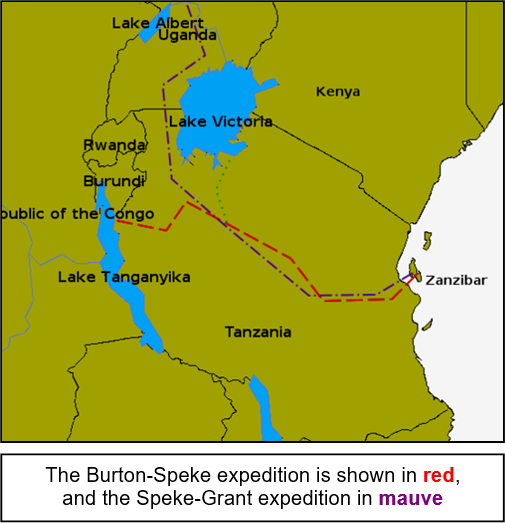 xxxxxIt was in 1857, after serving briefly in the Crimean War, that the English soldier and explorer Richard Burton joined up with his fellow countryman John Hanning Speke, in a second attempt to discover the source of the Nile. Sponsored by the Royal Geographical Society, they met on the island of Zanzibar off the east coast of Africa and then, sailing to the mainland, began their journey inland, hoping to find a large lake which, according to African hearsay, lay deep in the interior and was the source of the White Nile. The going proved extremely difficult. They followed jungle paths wherever possible, but the harsh terrain and climate took its toll. In February 1858 they became the first Europeans to reach Lake Tanganyika, but by that time both men were exhausted and seriously ill. Speke was virtually blind from sunstroke -
xxxxxIt was in 1857, after serving briefly in the Crimean War, that the English soldier and explorer Richard Burton joined up with his fellow countryman John Hanning Speke, in a second attempt to discover the source of the Nile. Sponsored by the Royal Geographical Society, they met on the island of Zanzibar off the east coast of Africa and then, sailing to the mainland, began their journey inland, hoping to find a large lake which, according to African hearsay, lay deep in the interior and was the source of the White Nile. The going proved extremely difficult. They followed jungle paths wherever possible, but the harsh terrain and climate took its toll. In February 1858 they became the first Europeans to reach Lake Tanganyika, but by that time both men were exhausted and seriously ill. Speke was virtually blind from sunstroke -
xxxxxWhen both men had made a partial recovery, they chose to go their separate ways. Having been told by the natives that a river further to the north flowed into the lake and not out of it, Burton became convinced that their attempt was a failure. Despite hearing of another lake in the area, he decided to return to Zanzibar, recover his health, and organise another expedition. Speke, on the other hand, chose to continue the search. He explored to the north-
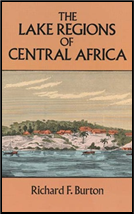 xxxxxAndxthe rift between the two men became even deeper in 1860 when Speke, now famous and widely respected, was chosen to lead another sponsored expedition to Lake Victoria, this time accompanied by his friend, the Scottish soldier and explorer James Augustus Grant (1827-
xxxxxAndxthe rift between the two men became even deeper in 1860 when Speke, now famous and widely respected, was chosen to lead another sponsored expedition to Lake Victoria, this time accompanied by his friend, the Scottish soldier and explorer James Augustus Grant (1827-
xxxxxTo settle the matter, it was eventually agreed that the two men should argue their case in public before the British Association for the Advancement of Science in September 1864. However, the day before the proposed debate Speke went out hunting and -
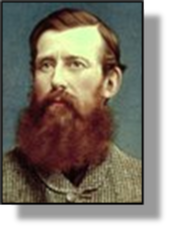
xxxxxThe expedition of 1857 was not the first time that Speke and Burton had explored together, nor quarrelled as a result. An officer in the British Indian Army since 1844, Speke had taken part in Burton’s disastrous expedition to Somalia in 1854, and had been stabbed several times when the party was attacked by a band of Somalis. They did not part the best of friends. On his final return to England in 1863, following his third expedition to Africa, Speke wrote his Journal of the Discovery of the Source of the Nile, and What Led to the Discovery of the Source of the Nile, published the year of his death.
xxxxxIn contrast to Speke, who was a quiet, well mannered man, Burton was an impulsive, daredevil explorer. A man of many talents, he had an adventurous and somewhat controversial career both before and after his expedition to Africa in 1857. He was born in Torquay, Devon, and after being expelled from Oxford University for bad behaviour, he joined the Bombay Native Infantry and served in India for some seven years. Then, anxious to go where no man had gone before, he travelled extensively in the Middle East, often disguised as a Moslem. He explored the Arabian peninsula and Somaliland, and in 1853 risked his life by visiting Mecca and Medina as an Afghan pilgrim, thus becoming one of the first Europeans to enter these holy Moslem cities. He then went one step further and paid a visit to the forbidden city of Harar in eastern Ethiopia. His expedition in 1855 to discover the 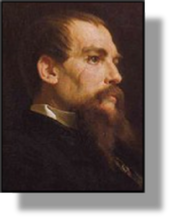 source of the Nile ended in failure but, as we have seen, in his second attempt, he and Speke became the first Europeans to reach Lake Tanganyika.
source of the Nile ended in failure but, as we have seen, in his second attempt, he and Speke became the first Europeans to reach Lake Tanganyika.
xxxxxBurton returned from Africa in 1861, travelling via Salt Lake City in the United States and Panama in Central America. Then, as a member of the British diplomatic service, he spent the next three years as the British consul at Fernando Po, off the coast of Nigeria, and was able to travel extensively in West Africa. Then came consular appointments in Santos, Brazil, Damascus in Syria, and eighteen years in the free port of Trieste. This variety of postings, together with his earlier exploration in the Middle East and east and central Africa, provided him with enough material for no less than 21 travel books. These included First Footsteps in East Africa, Wanderings in West Africa, and studies of Brazil, Paraguay, Syria, Zanzibar and the Mormons.
xxxxxIn addition, he wrote books on a number of other subjects, such as falconry and bayonet practice, and these were well received. However, using his skill as a brilliant linguist, his work as a translator raised a few eyebrows in the Foreign Office, and many more in Victorian society at large. In 1883, for example, he translated the Eastern erotic text Kama Sutra of Vatsyayana, and followed this by The Perfumed Garden three years later. And in earlier writings, notably those about his travels in West Africa, he tended to dwell on sexual matters, often of a perverse nature. It is probably for this reason that, following his death, his wife burned his diaries and unpublished manuscripts, destroying not only what was scandalous material, but also -

xxxxxAs far as his writing is concerned, Burton is probably best remembered today for his unexpurgated translation of The Tales of the Arabian Nights (sometimes known by his own title: A Thousand and One Nights), completed in 1888 and filling 16 volumes. This large collection of Arabic tales, probably based on stories handed down from the 10th century and originating in India, included such characters as Ali Baba, Aladdin and Sinbad the Sailor. Burton was knighted in 1886.
xxxxxThe tragic death of Speke in 1864 left in doubt the true source of the White Nile, but not for very long. The American journalist and explorer Henry Morton Stanley circumnavigated Lake Victoria four years after finding David Livingston at Ujiji in 1871, and an expedition led by the British officer Charles George Gordon (“Chinese Gordon”) -
xxxxxIncidentally, Speke discovered the Nile’s exit from Lake Victoria -
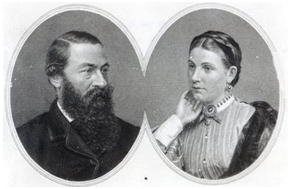 xxxxx…… Alsoxexploring central Africa at this time were the Englishman Samuel White Baker (1821-
xxxxx…… Alsoxexploring central Africa at this time were the Englishman Samuel White Baker (1821-
Va-


